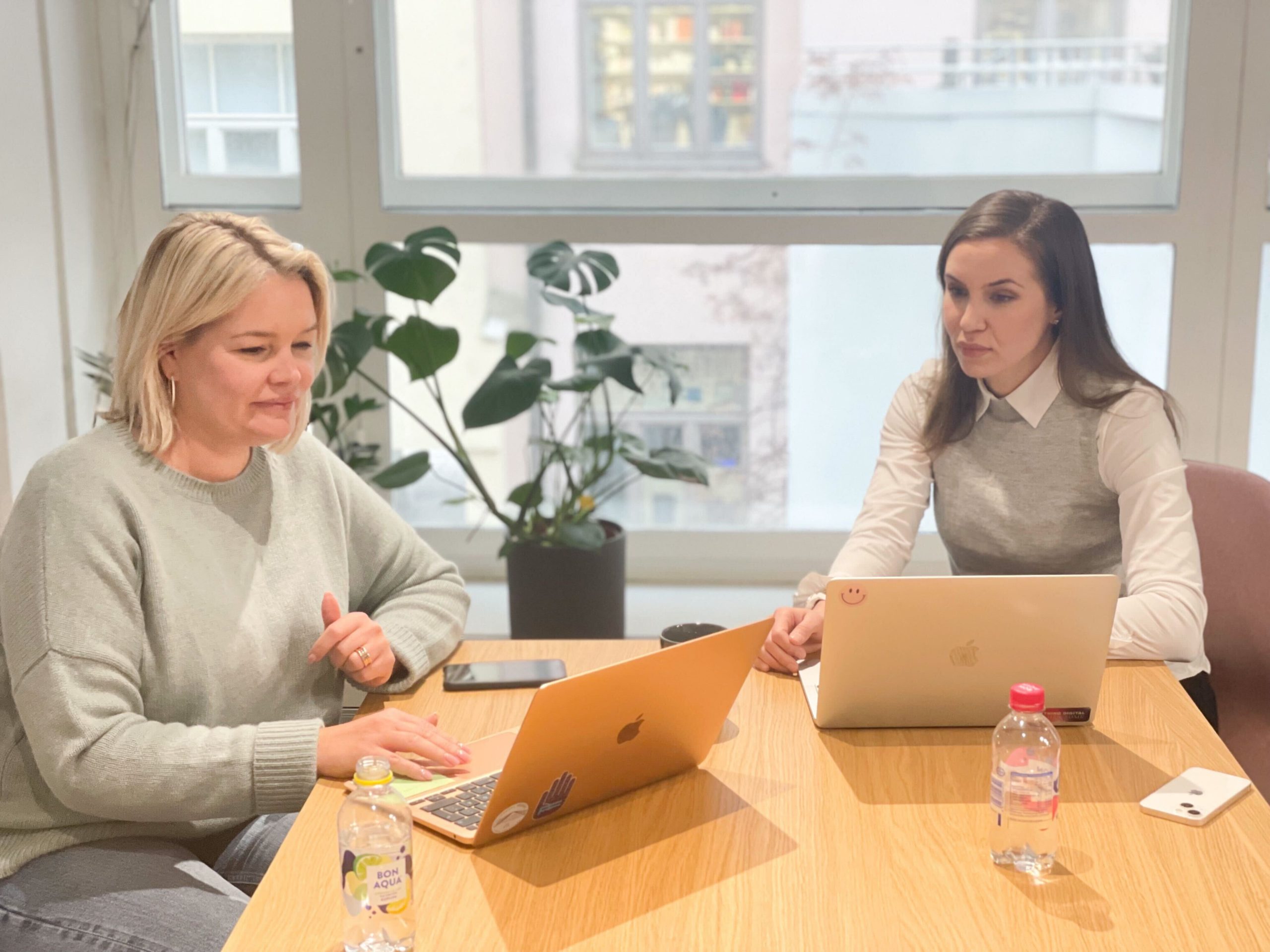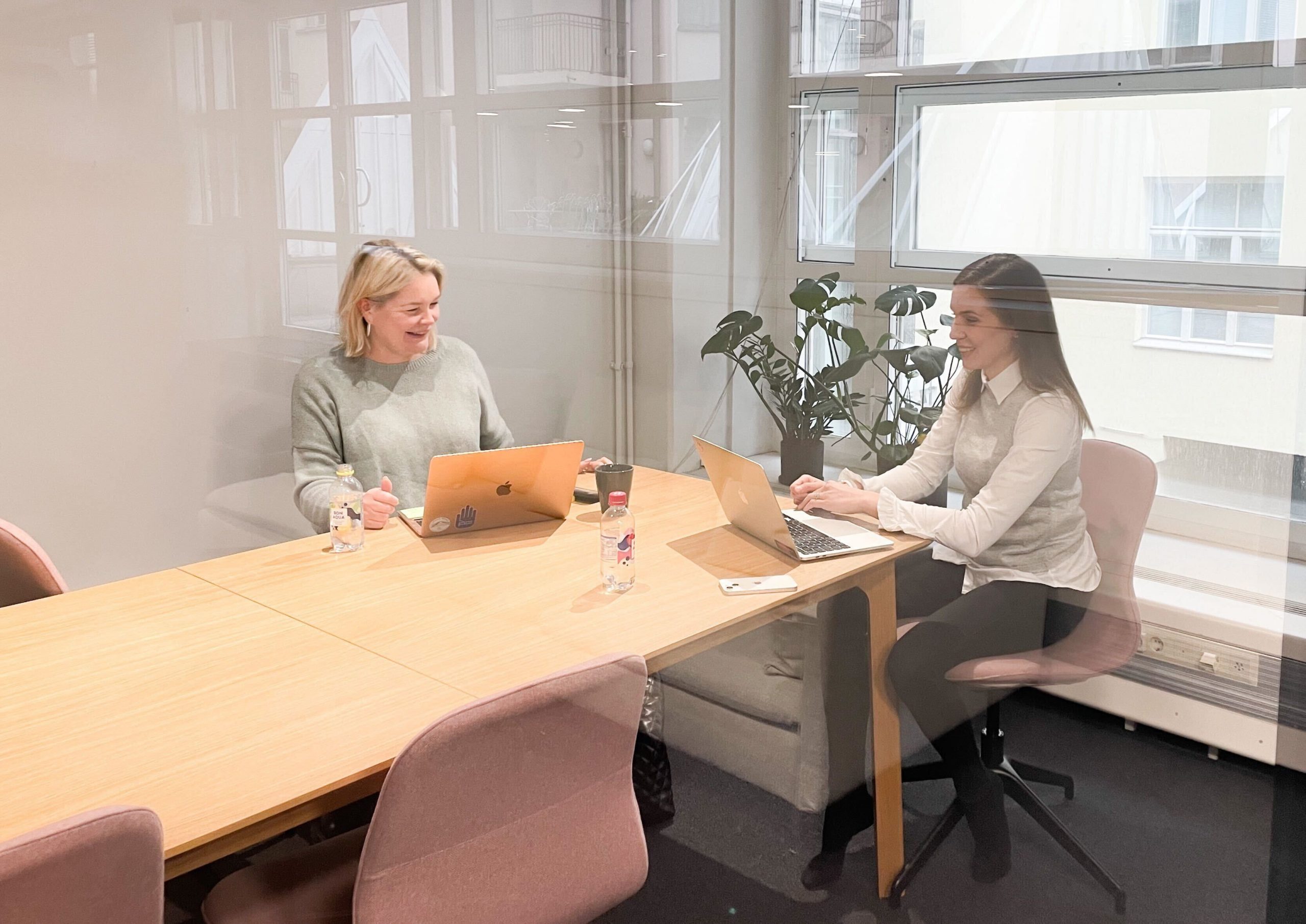Article
Which entrepreneurship myths need to be busted?

Entrepreneur. The brave type of person who gives up free time and family life to always be at work. Or? Two tech entrepreneurs, Emma Grönlund and Mikaela Nyman, have broken several myths in their entrepreneurial careers. It is important to recognize which truths you can learn from and which ones you can turn to your advantage.
Mikaela and Emma have several things in common. Both have a diverse entrepreneurial background, interest in technology and are leading a growth company as part of the Fusion Ecosystem network. Today, both women serve as CEOs of the professional services companies they founded.
Nieve Consulting Services, led by Mikaela, is a software development company in Malaga, one of Spain’s growing technology centers. Nieve stands out from local, more traditional software companies with its Nordic values, fair work culture and competitive salary model. Nieve’s mission is to create the best possible workplace for developers under the Malagian sun.
Emma, on the other hand, is the CEO and co-founder of the digital sales consulting company, Freyja. Freyja combines business and technology expertise. Its consultants help their customers remove sales friction through digitalization and develop business-relevant technological solutions to support sales.
Over the years, Emma and Mikaela have busted and learned to leverage certain entrepreneurial myths. Which of these do you recognize in your own everyday life?
Myth #1: An entrepreneur is a certain type of person
Entrepreneurial types of persons are often considered open-minded idea pumps or fearless visionaries. However, both Mikaela and Emma thinks that an entrepreneur is not a certain type of person, although a certain attitude and skills are useful.
“Not all successful entrepreneurs are visionary Steve Jobs or Elon Musks. There are many successful entrepreneurial stories, even if the product or service hasn’t revolutionized the whole world,” Emma points out.
“Anyone can be an entrepreneur. Rather, entrepreneurship only requires hard work, open-mindedness and the ability to adapt to changing situations,” adds Mikaela.
Many qualities useful in entrepreneurship can be practiced, and versatile experience makes it easier to respond to various situations. As an entrepreneur, difficult things are after all your own responsibility. Experience accumulates tools regardless of the role in which skills and experiences have been acquired.
“Personally, the biggest leap in my career was moving from the product business to consulting. The business model is different and what we do for customers is different than in produc business, but the tools and the problems to be solved are often the same,” says Emma as an example.
For Emma, the transition from product business to consulting was at the same time a leap outside the familiar network. However, creating networks is important for a specialised growth company. At best, networks can support not only the company to grow, but also the entrepreneur to strengthen the so-called entrepreneurial qualities.
Both Freyja and Nieve belong to Fusion Ecosystem, which is a network of digital growth companies accelerated by Reaktor. The network consists of more than 30 international future-builders. In Fusion, each company builds its own success story, but with close collaboration, individual companies are able to leverage the power of the ecosystem to accelerate their own and joint growth.

Myth #2: An entrepreneur is a fearless risk taker
Many people who consider becoming an entrepreneur, may worry about job continuity or financial security. However, a job in a large corporation is no guarantee of continuity or security either.
“It’s easy to hide behind financial risk. I still believe that the fear of failure can also be an obstacle for many. What if I can’t get the company to fly?” thinks Mikaela.
Those who want to become an entrepreneur should think, what risk actually prevents them from pursuing the dream. A certain kind of learning-from-failure and mistakes are part of entrepreneurship, and it is a very common narrative behind success stories these days. That is why becoming an entrepreneur is already a success in itself. In addition to hard work, even world-class success stories always involve luck and right timing.
Risk can also be seen in different ways. For others, exchanging a predictable employment for running your own business may seem like a huge leap of faith, even though entrepreneurship could at best enable a steeper learning curve, freedom of work and higher financial success. For others, the risk lies in the missed opportunity.
“I would consider it a bigger risk in life to be working somewhere just because I didn’t dare to go do what I really wanted. Entrepreneurship has made it possible for me to build a career on my own terms. I’ve been able to do and learn exactly the things that interest me and built a career path that suits me,” says Emma.
If there are people around who are encouraging, then it is easier to pursue entrepreneurial dreams. You can also seek peer support, valuable learnings and a sounding board for overcoming your own insecurities from various entrepreneurial networks.
Myth #3: Entrepreneurs in the tech industry are techies
The technology industry is still thought of as a field for techies or coders. Although there has been a development in a more diverse direction, teams in the technology sector are still relatively homogeneous. However, the good side of entrepreneurship is that you can create the kind of environment you need more of in your working life.
“I have always thought that professional identity should be built upon one’s competence, not on external factors. Education needen’t to detrermine the whole life or career path either, and suitable networks can be built even later. By founding a company yourself, you can make sure that the team includes people from different backgrounds,” reflects Emma.
Mikaela jumped into the technology sector because it represents the future. Nothing will work without technology in the furute.
“Technology has always fascinated me and it has always been easy for me to get how it works on a layman’s level. I’m not a coder, but I can understand what’s essential, communicate it to customers and think about the benefits of technology in a commercial sense,” says Mikaela.
Mikaelan noticed that the opportunities to develop and advance in the technology sector were completely different than in purely marketing and sales tasks. If you can manage to familiarize yourself with new technologies and develop your own skills, there is an endless need for help and expertise in companies.
Emma also feels that technology is and will increasingly be a part of companies’ success, regardless of industry. That is why understanding and skills need to be constantly developed in order to stay relevant.
“The journey from a sports-themed B2B2C marketplace to free-to-play mobile games and from there to consulting in the technology industry is so comprehensive and professionally developing that I don’t think I could have gotten it anywhere else,” she describes.
Myth #4: An entrepreneur is always working
There is some truth in the myth. When the aim is to make a growth leap, work may also fall into the evenings, weekends and holidays. In the beginning, work overloads come more easily, but with age and experience, the ability to determine what is a sustainable amount of work increases.
“Working hard doesn’t mean the traditional myth of an entrepreneur working 24/7, but I myself have been able to combine the everyday life of a family with children, active sports and growing a company. This can be done with effective planning and, of course, family support,” says Emma.
Mikaela has also experienced that even though the workload is heavy at times, it gives more than it takes. In addition to fast career development, interesting clients and projects, and financial success, entrepreneurship has enabled the dreams of her whole family. Thanks to Nieve, Mikaela and her family have been able to move abroad.
“In my opinion, entrepreneurship, gives more flexibility to combine family and work life. I approach my career in such a way that the work I do as an entrepreneur gives flexibility. And I can take time off when I need it,” Mikaela reflects.
At the end of the day, the world is never complete and there is always work to be done even as an employee. Thus, it is an advantage to be able to build a more sustainable work culture through your own company.





